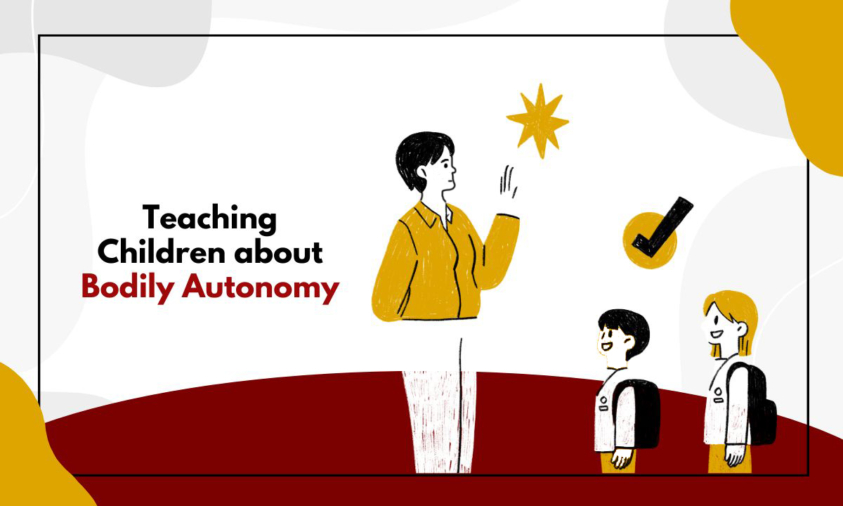It could be challenging for parents and people from conservative cultures to talk openly about sex at home. They may feel that they don’t know enough to initiate a discussion about it. They may also believe that young children shouldn’t be taught about sexual activity and any associated behaviours.
Why should a child feel ashamed of sex? Why is it a taboo? Let’s talk about this myth!
Children, through their connections with others, find a fertile ground to hone their ability to assert themselves in situations that challenge and comfort them. The decision-making skills they develop in these formative years will accompany them into adulthood. To truly understand themselves and their environment, children rely on stable, dependable adults.
You have the potential to be that adult, guiding them to embrace body autonomy and break down societal taboos!
What is body autonomy?
Body autonomy: Bodily autonomy means having full control over your own body, deciding who gets to touch you and how. It’s about ownership, choice, and respect. Your body is yours, and no one else gets to make decisions about it. It’s a matter of personal power, dignity, and the right to choose what happens to you, regardless of gender.
Positives of talking to children about bodily autonomy
- Promoting personal boundaries
Kids need to know they have the right to say no to unwanted physical contact, even from friends or family. Learning to set and stick to their boundaries helps them grow in confidence and self-respect.
- Instills consent at a young age
Understanding consent is about showing respect in every aspect of life, not just in physical interactions. When children learn to ask before hugging a friend or borrowing an item, they develop empathy and a deep respect for others’ boundaries.
Children who learn about consent early on can recognize and articulate when something feels wrong. Encouraging them to confide in you whenever they feel uncomfortable ensures they have a trusted support system.
- Enables them to express themselves
Children who understand body autonomy are more likely to speak up about inappropriate behaviour or uncomfortable situations. They will feel confident that their voices matter and that their feelings are valid. When kids learn to recognize and assert their rights at home, asking questions without fear of being ignored, they gain the knowledge, choices, and support they may need in the future.
- Gets them ready for positive/healthy relationships
Children who understand body autonomy grow into adults who can confidently and respectfully navigate friendships, dating, and social interactions. This awareness empowers them to advocate for themselves and recognize red flags in relationships.
- Accepting that talks about bodily autonomy are related to sexual health
By fostering open and honest conversations about sex, you empower your children to make informed choices in the future. When they feel safe to ask questions at home without fear of dismissal, they gain a clear understanding of their rights, the resources available to them, and the options they may need in life.
- Reduces Shame and Confusion
Certain topics are often considered ‘taboo,’ making people reluctant to discuss them openly with family or friends. Over time, society has deemed these subjects inappropriate for casual conversation. However, it’s crucial to recognize that our bodies are simply biological realities, and having fundamental knowledge about them is essential for maintaining good health and hygiene.
When conversations about bodily autonomy are avoided, young individuals may develop feelings of insecurity or shame about their own bodies. Providing clear, honest, and age-appropriate information helps reduce embarrassment and fosters an environment where such discussions feel natural and normalized.
How to discuss bodily autonomy?
- Use age-appropriate terminology that is straightforward and easy to understand.
- Encourage children to communicate their preferences and feelings.
- Remind them that they can communicate any worries and queries at any time.
- To reinforce consent, respect their decision when they decline physical contact such as hugs and so on.
- Teach the correct names for bodily components, in order to encourage body awareness and safety for your children.
- Realise that this will be a long-term conversation, progressing as your child ages. Prepare to switch the type of language used, and what is discussed regarding bodily autonomy from younger to older children.
A 2017 Buzzfeed article, covering multiple different sex-ed/ body autonomy stories from around the world, combines the good, the bad and the ugly. One of the stories mention’s that they were shown a video on hedgehogs mating, narrated by David Attenborough. While that is still counts as biology, that is not exactly what is being looked for!
Other stories involved, “abstinence making the heart grow fonder” and “I didn’t know sex was my choice.” An Indian writer compared their school’s sexual education to a meeting of Dumbledore’s secret army, in hushed tones and being told not to speak about it once they left the room.
Parents may assist their children in developing a sense of empowerment, respect and safety in their own bodies by having these discussions with them frequently and at a young age.
Be aware, and help your child, do not let them learn from pornography and social media, let them understand from you.
In case you are looking for customized child safety training, POCSO-related training, or POCSO advisory services, please feel free to reach out to us at +919004521614 or [email protected].
Authored by Tara Chanda, Content Writer Intern


 Cart is empty
Cart is empty 
